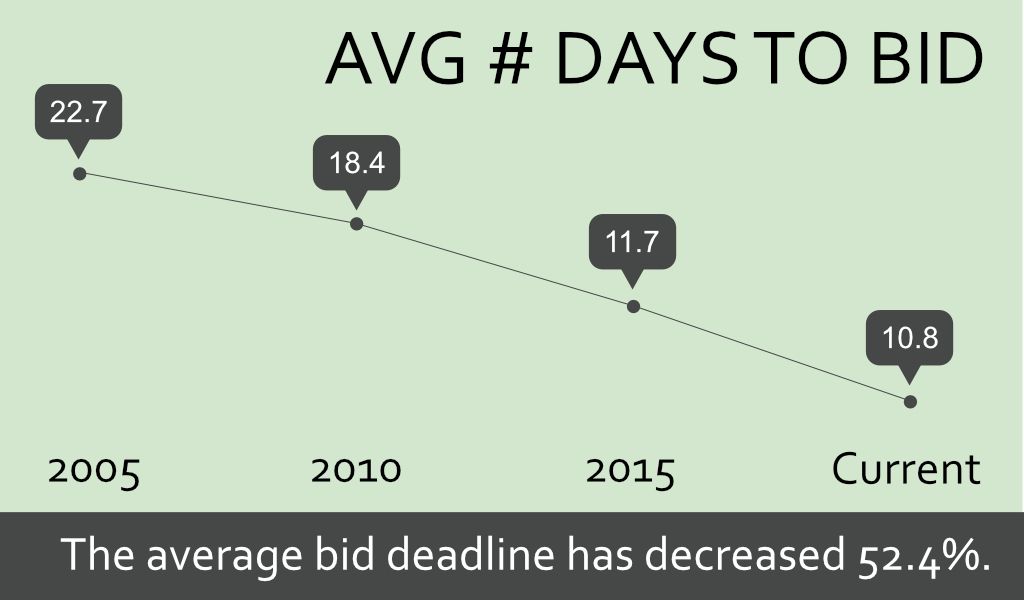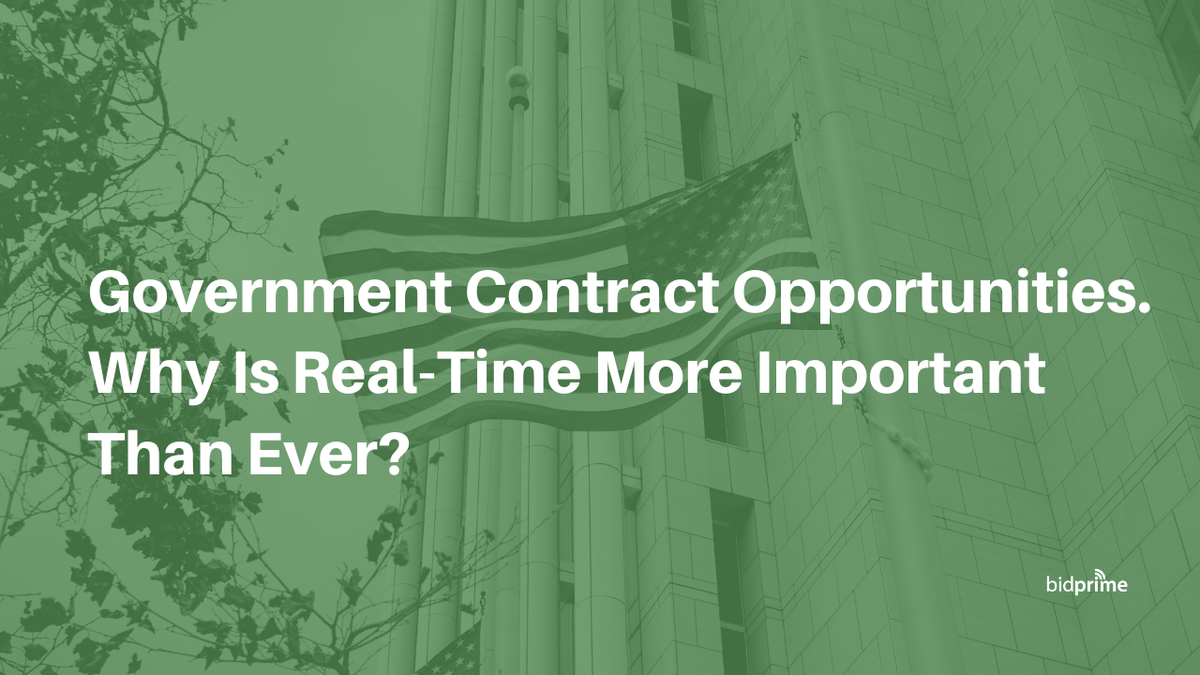The window of time between the announcement of a government contracting opportunity and its expiration continues to shrink as a result of technology innovation, process improvements, and other factors.
This matters whether you’re a federal contractor, a sole proprietor, or something in between, because time is money. In order to raise your chances of success at government contracting, you need to know about federal, state, and local government bid opportunities as they happen.
Never has the need to swiftly learn of opportunities been more vital than now. And all indications are that this need will continue growing in importance in the months and years ahead as government entities accelerate their push to further truncate the bid/RFP announcement-to-expiration window.
A trend we at Bidprime have observed over the years reveals that government entities are not only condensing the bidding timeframe but are also applying it to more and more of the bidding opportunities they announce.
In 2005 for example, the average span from the moment a public-sector agency posted a new solicitation until the time it expired was slightly under 23 days.
Ten years later, the average number of days a bid remained open stood at 11.7—a reduction of roughly 50 percent.
Between 2015 and now, the days from posting to expiration have declined further, albeit not to the same dramatic extent as occurred between 2005 and 2015. In the four plus years since 2015, the average number of days a bid remained opened has decreased to 10.8.
Our Bidprime research team queried our database to assess bid/RFP/solicitation data going back a decade (and then some). The objective was to make sense of the days-open trendlines, so you can see the importance of finding out about opportunities early to best position your business for success. The chart below summarizes those trends. As you’ll see, bid deadlines have been trending consistently toward shorter and shorter timeframes.

Notes
● In 2005, the average time-to-bid was 22.7 days.
● The window between the date of release and the date of closing for all U.S. federal, state, and local bids combined has grown smaller—just as it had done each successive year since 2015 when the time-to-bid was 11.7 days. Currently, the time-to-bid is 10.8 days.
● A 7.69-percent drop in the average amount of time-to-bid has occurred over the last ~five years.
● Government entities are issuing fewer long, multiyear term contracts. This is a trend that shows no sign of ending. In place of multiyear term contracts, government entities have shown a preference for issuing bids / RFPs. These have gained favor because the issuing entities find them less binding.
● Here to stay are Quick Quotes—bids that expire very soon after issuance. Government entities at all levels across the U.S. are utilizing them with increasing frequency.
● There is arguably lighter competition for contracts announced via Quick Quotes than for those associated with more traditional deadline timeframes. Quick Quotes tend to attract fewer bidders—a consequence of entities distributing these requests to restricted numbers of vendors and stating a desire to purchase only in smaller quantities.
Bid-processing timeframes will shrink further
Over the past several years, procurement automation—”e-procurement”—has made rapid and significant gains.
Similar to our analysis in April 2015, these gains—which amount to substantial upgrades of the bid request/RFP process—have helped dramatically decrease bid-processing timeframes.
Further reductions in these timeframes appear likely. As a result of the decreases obtained to date, it is now the case that a bid request/RFP for a quick, competitive purchase (rather than a locked-in term contract) can potentially draw multiple bid submissions in less than 24 hours after issuance.
What this means for your business
Your focus on winning more government contracts has possibly grown greater because of the ongoing coronavirus pandemic.
Successful vendors of government-purchased goods, services, and solutions have learned this basic rule: landing a contract requires investments of time and preparation—and the more of each, the likelihood of winning increases.
More specifically, you must carefully review and fully understand the request before you begin assembling your bid. You must also be well acquainted with the requesting agency. On top of that, understanding your competition can be valuable. Lastly, you need to strengthen your proposal by undertaking rigorous critiquing.
Many winning vendors became winning vendors by adding to their investments of time and preparation, along with robust and reliable processes and tools for identifying and qualifying opportunities. You should do likewise if you haven’t already. Part and parcel to this would be development and implementation of a plan to document and continually evaluate your bidding strategy.
Bottom line: when it comes to the capture of opportunities, timing can be everything. And it won’t do you much good to have a great plan, the capacity for nimble actions, a team that knows its bid-formulation responsibilities, and strict monitoring of approaching deadlines if you are identifying opportunities days later than your competition. Sure, you’ll have a more effective and efficient proposal process. But what you won’t have is the benefit of getting the jump on your competitors.
Because timeframes are shrinking, it’s more imperative than ever that you receive bid requests and their supporting documents as quickly as possible.
One of the benefits of using BidPrime is you can look forward to receiving applicable bid requests in real-time, immediately upon release.
Along with our robust technology, we’re the only such service that offers comprehensive coverage of Quick Quotes. Other databases and search engines ignore or simply miss Quick Quotes.
There is much untapped government business awaiting you. To capture it, you need to be able to put eyes on the opportunities. Although governments are narrowing the window during which you can submit a bid/proposal, there’s no reason why you should let opportunities slip past you—or, worse, be discovered too late to do anything about.
To discuss how we can help you gain the advantage of real-time bidding intel, call us at (888) 808-5356 or visit BidPrime.

